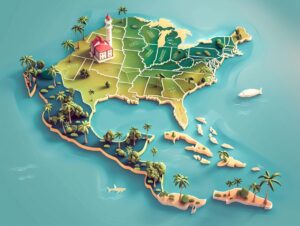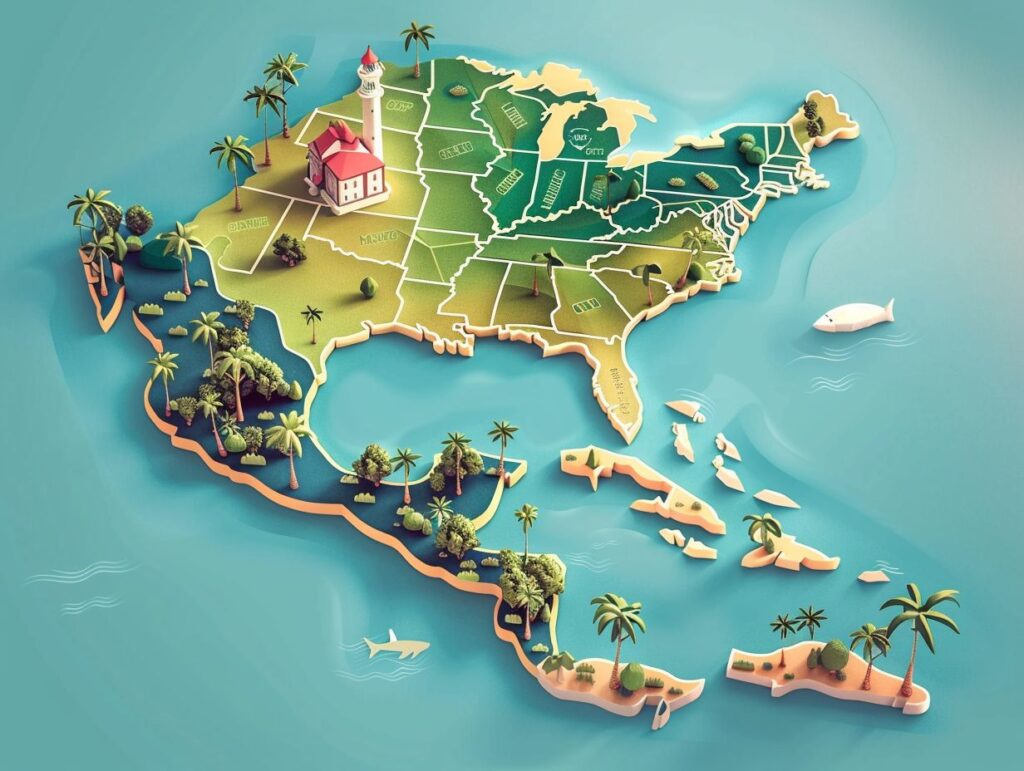Florida’s tourism industry is a bustling and competitive landscape, with businesses vying for the attention of travelers from all over the world. In this article, we will explore the crucial role that trademarks play in this industry. From building brand identity to protecting intellectual property, trademarks are essential for attracting tourists and standing out in the crowd.
We will also highlight some famous trademarks in Florida’s tourism sector and discuss how businesses can obtain and protect their own trademarks. We will delve into the legal consequences of trademark infringement and provide tips on using trademarks to thrive in the competitive tourism industry. So, let’s dive in and discover the power of trademarks in Florida’s vibrant tourism scene!
Key Takeaways:
- Trademarks help build brand identity and attract tourists to Florida’s tourism industry.
- Registering and enforcing trademarks is essential for businesses in the tourism industry to protect their intellectual property.
- Collaborating with other businesses and utilizing trademarks in marketing can help businesses stand out in the competitive tourism industry.
What Are Trademarks?
Trademarks are specific signs, symbols, or expressions that differentiate products or services from a particular source, distinguishing them from those of other entities. They can take the form of trademarks, service marks, certification marks, or collective marks.
Service marks, in contrast to trademarks that identify goods, serve to differentiate services offered by one entity from others. For example, a service mark might be a logo that represents a particular service provider.
Certification marks signal that products or services adhere to specific standards or criteria established by an organization. An instance of this would be the “Fair Trade Certified” mark, indicating conformity with fair trade principles.
Collective marks, conversely, are utilized by members of an association to associate themselves with a specific group, such as “Made in Italy” for products manufactured in Italy.
Why Are Trademarks Important in the Tourism Industry?
Trademarks are important in the tourism industry as they safeguard intellectual property, boost marketing campaigns, and contribute to the economy. Organizations such as VISIT FLORIDA depend on robust trademark strategies to draw in visitors and bolster the tourism sector.
How Do Trademarks Help Build Brand Identity?
Trademarks play a crucial role in establishing brand identity by crafting a recognizable image and reputation for businesses in the tourism sector, as demonstrated by the effective marketing campaigns of VISIT FLORIDA.
These unique symbols serve to differentiate one company’s offerings from its competitors and evoke specific emotions and connections in the minds of consumers. VISIT FLORIDA’s strategic utilization of its distinctive orange logo and engaging slogan ‘Where Everything Surprises‘ has enabled them to carve out a distinctive position in a competitive marketplace.
Through the consistent application of these trademarks across a range of platforms and promotional activities, VISIT FLORIDA has effectively nurtured a robust brand presence that resonates with travelers looking for distinctive and unforgettable experiences.
How Do Trademarks Protect Intellectual Property?
Trademarks provide legal protection for intellectual property by granting exclusive rights to use specific signs, symbols, or expressions. This prevents unauthorized use and ensures legal protection in the tourism industry.
This form of legal safeguarding is essential for protecting tourism-related brands and assets from infringement and imitation. Registering a trademark allows businesses to establish a unique identity in the market, fostering brand recognition and loyalty among consumers. Trademark protection enables businesses to seek damages in cases of infringement, serving as a deterrent against potential copycats.
Additionally, trademarks enable companies to expand internationally, as they can be recognized and enforced in multiple countries. This enhances their global presence and competitiveness.
How Do Trademarks Attract Tourists?
Trademarks play a crucial role in attracting tourists by establishing trust and recognition through effective marketing strategies. This, in turn, makes destinations more appealing and ensures a consistent visitor experience.
By utilizing recognizable symbols and slogans, destinations can effectively communicate their unique identity and offerings to potential visitors. This helps tourists make informed decisions by associating positive attributes with the destination’s brand.
Trademarks also function as a valuable tool for destination marketing organizations to set themselves apart in a competitive market, creating a distinct position that resonates with target audiences.
Through strategic trademark management, destinations can develop a strong brand presence that not only attracts tourists but also cultivates loyalty and positive word-of-mouth recommendations, ultimately enhancing their reputation in the tourism sector.
What Are Some Famous Trademarks in Florida’s Tourism Industry?
The tourism industry in Florida features various well-known trademarks, such as Disney’s Mickey Mouse, Universal Studios’ Jurassic Park, and SeaWorld’s Shamu. These trademarks play significant roles in drawing millions of visitors to the state annually.
Disney’s Mickey Mouse
Mickey Mouse, a trademark of Disney, is widely recognized worldwide and has a significant impact on tourism by attracting numerous visitors to Disney theme parks in Florida.
The character of Mickey Mouse made his debut in the animated short film ‘Steamboat Willie’ in 1928, enchanting audiences with his charm and whimsical personality. Since then, Mickey has evolved into a global cultural icon, representing the magic and creativity synonymous with Disney.
The popularity of the character has been instrumental in driving tourism to Disney properties in Florida. Visitors are drawn to the iconic attractions, shows, and parades that showcase Mickey and his friends. This enduring appeal continues to attract individuals of all ages to the enchanting realm of Disney, establishing Mickey Mouse as a beloved figure across generations.
Universal Studios’ Jurassic Park
The Jurassic Park trademark at Universal Studios is a significant attraction for tourists, offering exciting attractions and experiences that engage visitors from all over the world. From encountering life-sized dinosaurs to immersive rides that transport guests back to the prehistoric era, the Jurassic Park themed area at Universal Studios delivers an unforgettable adventure for fans of the iconic movie franchise.
The meticulous attention to detail in the design and storytelling creates a deeply immersive experience, allowing visitors to feel like they are stepping into the world of dinosaurs. The popularity of Jurassic Park has resulted in increased foot traffic at Universal Studios, with many tourists specifically opting to visit the theme park to experience the Jurassic Park magic.
SeaWorld’s Shamu
The Shamu trademark associated with SeaWorld has become widely recognized in the realm of marine life entertainment, attracting many tourists to SeaWorld parks in Florida to witness the famous orca shows.
The presence of the Shamu trademark has been instrumental in bolstering SeaWorld’s appeal to tourists, acting as a major draw for individuals seeking memorable interactions with these impressive marine animals. Through engaging performances and interactive exhibits centered around Shamu, SeaWorld has solidified its position as a top choice for marine enthusiasts worldwide.
The enduring popularity of the Shamu brand has not only drawn in visitors but has also played a significant role in enhancing SeaWorld’s overall brand perception as a leading figure in marine conservation and entertainment.
How Do Businesses in the Tourism Industry Obtain and Protect Trademarks?
Businesses in the tourism industry, such as organizations like VISIT FLORIDA, acquire and safeguard trademarks through a formal registration procedure that includes applying at the state level with the Florida Department of State and obtaining federal registration with the United States Patent and Trademark Office.
The Trademark Registration Process
The trademark registration process includes submitting applications to the Florida Department of State and the United States Patent and Trademark Office, along with the necessary fees and documentation.
Once the applications are submitted, they undergo a thorough review by trademark examiners at both state and federal levels. These examiners evaluate the applications to ensure they meet the specific requirements for trademark registration, such as distinctiveness and non-infringement.
Any discrepancies or issues identified during this review process may be communicated to the applicant for clarification or corrections.
If the examination is successful and the application is approved, the trademark is officially registered, and the applicant receives a certificate of registration. Throughout this process, both state and federal offices play essential roles in supervising and facilitating the registration process to safeguard intellectual property rights.
Enforcing Trademark Rights
Enforcing trademark rights is an important aspect of brand maintenance within the tourism industry. Entities like VISIT FLORIDA often utilize legal measures, such as cease and desist letters, to address infringements.
Cease and desist letters are formal notifications used to caution individuals or businesses against the unauthorized use of trademarks. By employing these letters, companies in the tourism sector, such as hotels, travel agencies, and destination marketing organizations, can assert their rights and prevent any dilution of their brands.
Additionally, businesses within the tourism industry may choose to register their trademarks to establish legal protection for their logos, slogans, or other distinctive elements. This proactive approach not only helps protect their intellectual property but also acts as a deterrent to potential infringers looking to exploit their reputation and goodwill.
What Are the Legal Consequences of Trademark Infringement in the Tourism Industry?
Trademark infringement in the tourism industry can result in serious legal ramifications, such as lawsuits and considerable damages, that can have a significant effect on businesses and their brand reputation.
Cease and Desist Letters
Cease and desist letters are commonly used as the initial step in addressing trademark infringement, formally demanding the cessation of unauthorized use of a trademark within the tourism sector.
These letters have a significant role in safeguarding the branding and intellectual property of businesses in the tourism industry. By clearly defining the alleged infringement and requesting prompt compliance, cease and desist letters establish a legal foundation for resolving disputes without resorting to expensive litigation.
This proactive approach can help deter further unauthorized use of a trademark, protecting the reputation and market position of the affected company. Additionally, it acts as a cautionary measure for potential infringers, indicating that the trademark owner is diligent in asserting their rights.
Lawsuits and Damages
Trademark infringement cases often result in lawsuits and damages, with the infringing party potentially facing significant financial penalties and legal fees.
In the tourism industry, businesses heavily rely on their brand names and logos to attract customers and distinguish themselves from competitors. When a company’s trademark is infringed upon, it can create confusion among consumers and damage the reputation of the original brand.
Proving trademark infringement in a lawsuit requires demonstrating that the infringing party used a similar mark in a way that caused consumer confusion. Calculating damages in these cases can be intricate, considering factors such as lost profits, potential harm to brand reputation, and profits gained by the infringing party.
The financial repercussions of trademark infringement can be substantial and may have lasting effects on businesses in the tourism sector.
How Can Businesses Use Trademarks to Stand Out in the Competitive Tourism Industry?
Businesses have the option to utilize trademarks in the competitive tourism sector to establish a distinctive presence. This can be achieved by developing unique and memorable brand identifiers, incorporating them into marketing and advertising initiatives, and considering co-branding collaborations with other businesses, as demonstrated by the successful strategies employed by VISIT FLORIDA.
Creating Unique and Memorable Trademarks
Establishing a strong brand identity in the tourism industry requires creating unique and memorable trademarks. This helps businesses differentiate themselves and attract more visitors.
A distinctive trademark not only distinguishes a business from competitors but also acts as a symbol of trust and quality for consumers. By incorporating unique brand elements such as logos, slogans, and colors, companies can effectively communicate their values and offerings.
For instance, consider Airbnb with its recognizable belo symbol representing inclusivity and belonging, or the well-known “I Love NY” logo synonymous with New York City. These brands have successfully utilized their distinctive trademarks to leave a lasting impression and forge strong connections with travelers.
Utilizing Trademarks in Marketing and Advertising
Effectively utilizing trademarks in marketing and advertising can significantly enhance a brand’s visibility and appeal in the tourism industry, as exemplified by the innovative campaigns of VISIT FLORIDA.
Creating a strong association between a trademark and its unique offerings allows companies to establish a solid brand identity. This differentiation helps them stand out from competitors and fosters customer loyalty. For instance, Coca-Cola’s iconic logo and branding have made it globally recognizable, contributing to its lasting success.
Integrating trademarks into all facets of marketing, from social media campaigns to physical packaging, ensures consistent brand messaging and nurtures customer trust. This unified approach can result in improved brand recognition and ultimately drive sales growth.
Collaborating with Other Businesses for Co-Branding Opportunities
Collaborating with other businesses for co-branding opportunities can enhance brand reach and create cohesive marketing efforts, utilizing shared trademarks to attract a broader audience in the tourism industry.
By partnering with complementary brands, companies can tap into each other’s customer bases, enhancing brand visibility and credibility. Co-branding partnerships enable businesses to combine resources, split costs, and access new markets more effectively. Through strategic alliances, companies can leverage each other’s strengths, leading to innovative product offerings that cater to a wider range of consumer preferences.
Employing shared trademarks aids in building trust and recognition among consumers, ultimately increasing sales and market positioning in a competitive industry landscape.
Frequently Asked Questions
What is the role of trademarks in Florida’s tourism industry?
Trademarks play a crucial role in Florida’s tourism industry by protecting the unique brands and identities of businesses and attractions that draw visitors to the state.
How do trademarks benefit Florida’s tourism industry?
Trademarks help businesses in Florida’s tourism industry stand out from competitors and build brand recognition, ultimately attracting more visitors and contributing to the state’s economy.
What types of businesses in Florida’s tourism industry use trademarks?
Hotels, theme parks, restaurants, and other attractions in Florida’s tourism industry use trademarks to distinguish their products and services from others and create a strong brand image.
Can small businesses in Florida’s tourism industry benefit from trademarks?
Absolutely. Trademarks are not just for large corporations. Small businesses in Florida’s tourism industry can also use trademarks to protect their unique brands and attract more customers.
What happens if someone infringes on a trademark in Florida’s tourism industry?
If someone uses a trademark without permission or in a way that could cause confusion, the trademark holder can take legal action to protect their rights and prevent harm to their business.
Are there any specific rules or regulations for using trademarks in Florida’s tourism industry?
In Florida, trademarks are governed by state law and must also comply with federal trademark laws and regulations. It is important for businesses in the tourism industry to consult with a trademark attorney to ensure proper use of their trademarks.



























Rate this article:
No Comments yet!